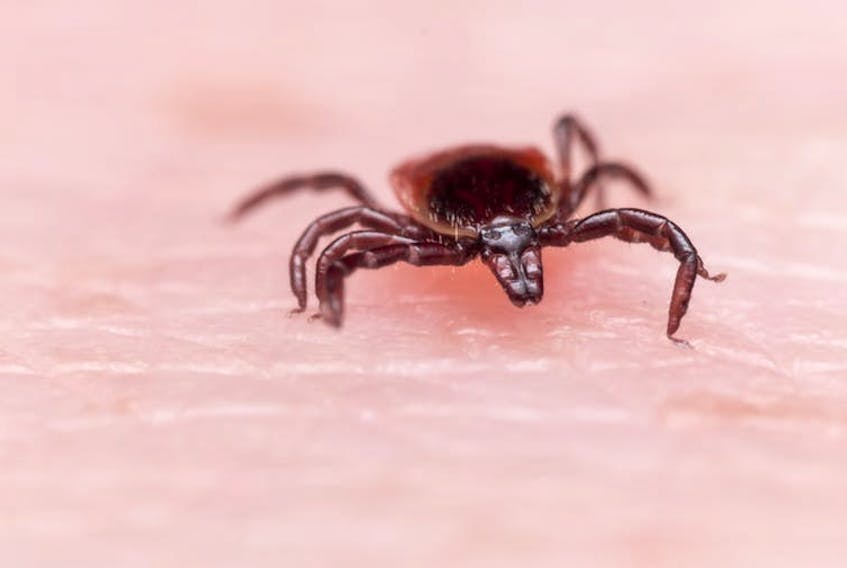Margôt Maddison-MacFadyen, PhD
Guest Opinion
A family member of mine has been recently diagnosed with Lyme Disease by a doctor in Maine. His blood, which we sent to IGeneX, a California lab that specializes in testing for tick-borne diseases, also came back positive for Lyme Disease. Thus, his Lyme Disease diagnosis was confirmed by his positive IGeneX test.
Four years ago, this same family member was diagnosed with Multiple Sclerosis (MS) by a neurologist here on Prince Edward Island. MS is one of several diseases that has similar symptoms to Lyme Disease. Although we suggested Lyme Disease as a possible underlying cause of the MS at the time, we were told that because there are no deer on P.E.I., Lyme Disease is ruled out.
Blacklegged (deer) ticks that carry borrelia burgdorferi, the bacteria that causes Lyme Disease, do not need deer to live on. Ticks arrive in the Maritime provinces in the spring on birds. From the birds, they move to mice and to any other warm-blooded animals, including humans, that can give them a blood meal.
A 2017 scientific study conducted by biologist Dr. Vett Lloyd of Mt. Allison University confirms that P.E.I. is home to blacklegged ticks. For her study, over 350 blacklegged ticks were collected from across P.E.I. Ten per cent of these ticks were found to be infected with Lyme.
MS or Lyme Disease? Two alternative diagnoses. I prefer Lyme Disease because even late stage Lyme Disease can be cured with antibiotics—but only if you can get the dose of antibiotics that will kill the Lyme.
Getting a diagnosis, a fulsome blood test, such as the test by IGeneX, and then the required dose of antibiotics are the reasons why my family member who has Lyme Disease is now going to Maine for treatment.
We are not alone. Over 100 others from the Maritime provinces who are suffering with Lyme Disease have been to our doctor in Maine since May 2018. Three are from P.E.I. Over 60 are from New Brunswick, and over 30 are from Nova Scotia.
Here on P.E.I., as in all Canadian provinces, our physicians’ hands are tied. Physicians are reluctant to provide the necessary doses of antibiotics beyond the initial three-week acute phase for fear of running afoul of current (obsolete) clinical guidelines. Yet a person with late stage Lyme Disease needs long term antibiotics to beat the disease.
Until recently in Maine, physicians faced a similar problem. It was overcome in 2015 when Maine legislators passed “An Act to Improve Access to Treatments for Lyme Disease” (HP0289, LD422 Item 1). Now physicians in Maine are free to appropriately treat for Lyme Disease without fearing that they might have their licenses to practice medicine revoked by health authorities.
On Jan. 22, Chris Robinson presented “The Ticking Lyme Bomb” at the Hunter River Lions Hall. Chris is P.E.I. director of the Canadian Lyme Disease Foundation (CanLyme.ca). Islanders drove from as far away as Murray Harbour to attend, and several people attested that they or their loved ones have been bitten by a tick and have Lyme Disease.
With the evidence before us, specifically Dr. Vett Lloyd’s conclusive research, but also testimonies from Islanders who have been bitten by a tick and are sick, I strongly suggest that it is time for Island legislators to act.
First, Public Health should revise its current public health messaging to warn Islanders and physicians that Lyme Disease is here and continuing to spread. Secondly, P.E.I. legislators should consider adopting the approach taken by Maine, which passed a law protecting physicians and, therefore, enables effective care for Lyme Disease patients.
I sincerely hope our legislators will realize the significant threat posed by Lyme Disease and that they will act quickly to enact enabling legislation that will untie the hands of Island physicians.
Margôt Maddison-MacFadyen, PhD, is a P.E.I. resident and Banting Postdoctoral Fellow in the Departments of History & Geography at Nipissing University.









